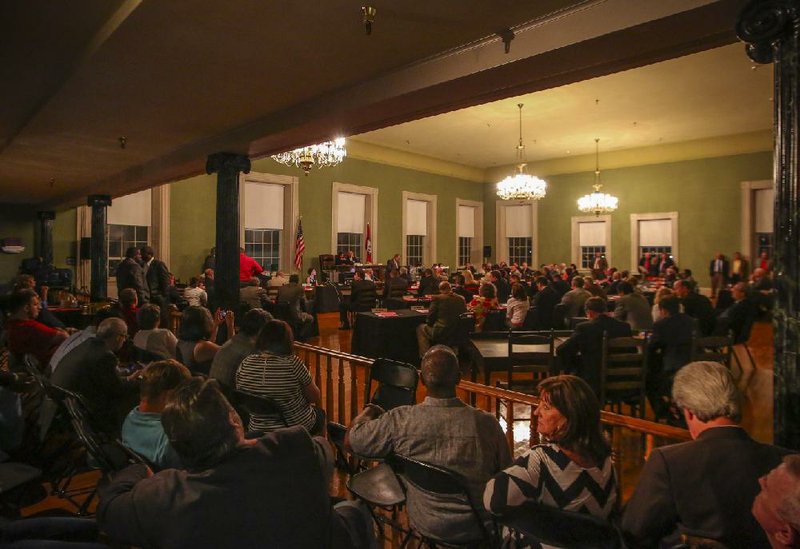The cost of this week's special session is expected to be higher than the Legislature's three-day session in October because the House chambers were unavailable because of renovations, officials said Wednesday.
The final tally for the session has not yet been calculated, but the House had to pay thousands of dollars to move temporarily to the Old State House Museum. Chairs, tables and sound equipment had to be rented and parking fees had to be paid.
Gov. Mike Beebe called the special session to increase funding for public school employees' health insurance, as well as funding to open prison and jail beds to alleviate crowding. A moratorium on the Arkansas Lottery Commission offering electronic-monitor games also was on the agenda. All of the measures easily passed both chambers and Beebe said he will sign the bills today.
Beebe said he selected issues that needed to be addressed before the next regular session.
"You weigh all that and then come to the conclusion that these are issues that need to be dealt with now," Beebe said.
In addition to its equipment rentals, the House spent $2,000 on hardware to make sure legislators and staff members would have Internet access in the building, which was the seat of state government from 1836-1911.
Gabe Holmstrom, the House chief of staff, said most representatives wanted to meet there.
"There were several options discussed, but the members we talked to were really excited about having a session in the Old State House. Initially when we went over and met with the staff and the Department of Heritage, it was very clear that they had a lot of things in place that would make it easy [to host the session]," Holmstrom said.
Holmstrom said House staff members knew they would see additional costs because they could not hold the session in the usual meeting place, but that the Old State House had "minimal infrastructure concerns."
The House has not yet received the bills for parking in the garage next to the Old State House or for security provided at the building, Holmstrom said. In addition to the hardware costs, the House paid $850 to rent chairs and tables, and $700 to rent a sound system, he said.
House spokesman Cecillea Pond-Mayo estimated the cost for security to be less than $1,000, but she said she did not have an estimate for parking.
The greater part of the session's costs was for the per diem given to each of the legislators. The House estimated it would pay about $42,990 to members living 50 miles or more from the Capitol for their per diem and mileage costs. Representatives who live within 50 miles of the Capitol would receive about $4,638, according to estimates from the House.
Pond-Mayo said the House spent $49,233 on the three-day special session in October, which included per diems, mileage and pay for staff members. Each representative living within 50 miles of the Capitol receives $61 a day, while those outside that area get a $148 per diem, she said. Representatives also can collect 56 cents per mile for their vehicle use.
While the House met at the Old State House on Markham Street in Little Rock, the Senate gathered in its usual chambers during the special session.
Ann Cornwell, the director of the Senate, said she didn't expect the cost of the session to be more than the $19,000 spent on October's three-day session. She said senators living 50 miles or more from the Capitol received a per diem of $148, while those living within 50 miles of the building were paid $61 a day.
Senators were also able to collect mileage reimbursements at a rate of 56 cents per mile, Cornwell said.
The Bureau of Legislative Research reported no additional costs attributed to the special session.
Metro on 07/03/2014


